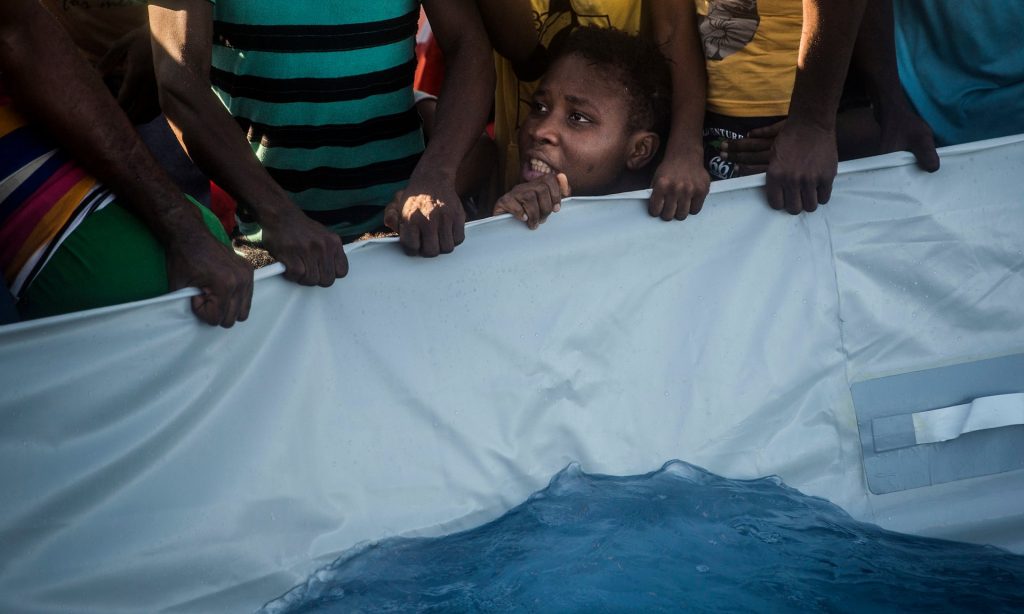
Photograph: Santi Palacios/AP
The Italian government’s decision to make a series of cuts to anti-trafficking programmes in Sicily and across the country will seriously undermine efforts to create a national response to the country’s growing trafficking crisis, NGOs and UN agencies are warning.
The UN’s International Office for Migration warned this week that the trafficking of Nigerian women from Libya to Italy by boat is reaching “crisis” levels. More than 3,600 Nigerian women arrived in Italy by boat in the first six months of this year, of whom 80% will be forced into prostitution in Europe, the IOM estimates.
Europol, the EU’s criminal intelligence agency, warned earlier this year that at least 5,000 unaccompanied child refugees have disappeared after arriving in Italy. Many are feared to have fallen into the hands of organised trafficking syndicates.
The Italian government’s equal opportunities ministry announced this week that funding for anti-trafficking programmes across Sicily is to cease. It will support one anti-trafficking programme in Ragusa, southern Sicily, but funding to Palermo, Messina and Catania, where the majority of migrant boats land, will be ending. Financial backing for anti-trafficking programmes in Piedmont, Sardinia, Basilicata and Liguria will also cease.
Anti-trafficking NGOs in areas affected by the cuts have warned this will leave Italy with a patchy and insufficient response to the increased trafficking of migrants entering the country.
“It’s incredible – there is a decree by the government saying that the protection of the trafficking victims has to be ensured at national level and the ministry of equal opportunities is leaving out almost six regions [Piedmont, Liguria, Valle d’Aosta, Basilicata, Sardinia and much of Sicily] at a time when the problem of trafficking is getting worse,” said Alberto Mossino from Progetto Integrazione Accoglienza Migranti (Piam), an anti-trafficking and migrant rights NGO in Asti, in the Piedmont region of Italy.
Mossino said that Piam, which in 2014 was presented to the Council of Europe by the Italian government as an example of best practice in anti-trafficking initiatives, was told this week that all of their funding will be cut from the beginning of September.
“Our region is one of the worst affected by the sexual trafficking of migrant women and children. The women that are now in our protection programmes will see these programmes shut down with short notice. We have been told that they will be transferred; this means that they will be forced to restart all the paths they are going though,” said Mossino.
“Life will be easier for traffickers operating in Sicily, or in Piedmont and other regions where these cuts have been made. This means that here in Piedmont there will be no outreach programmes. Any victim of trafficking who wants to escape will have to go on their own to their police to denounce their exploiters, there will be nobody to help them through this process.”
Penelope, an anti-trafficking organisation in Messina, Sicily, has also been informed of an immediate and total funding cut, said Cettina Restuccia, a coordinator with the NGO.
“We are seeing more and more young Nigerian teenagers arriving [on the migrant boats]. Many have been already raped and forced to prostitution during the trip from Nigeria to Libya,” said Restuccia. “But if we are not at the ports when the boats arrive in – or in the hospitals or reception centres, or at the commission hearings – who will help these girls?”
The IOM expressed concerns about the consequences of the cuts.
“The risk is that the places available for the trafficking victims in protection programmes will decrease and we are particularly worried for the unaccompanied minors,” said Simona Moscarelli, an anti-trafficking expert at the IOM. “There should be an increase, not a decrease, in the anti-trafficking interventions, particularly in Sicily.”
The ministry of equal opportunities defended the decision, saying it was increasing the amount of anti-trafficking funding from €8m (£6.9m) to €13m but that more resources would be channelled into a smaller number of service providers.
The ministry added that a “technical error” made in the application for funding by administrators in the Liguria and Piemonte regions had triggered cuts to anti-trafficking initiatives. The decision to end funding to NGOs in eastern Sicily was put down to concerns over the quality of the services provided, but the department expressed confidence that the grant given to Ragusa would cover services across the island.

